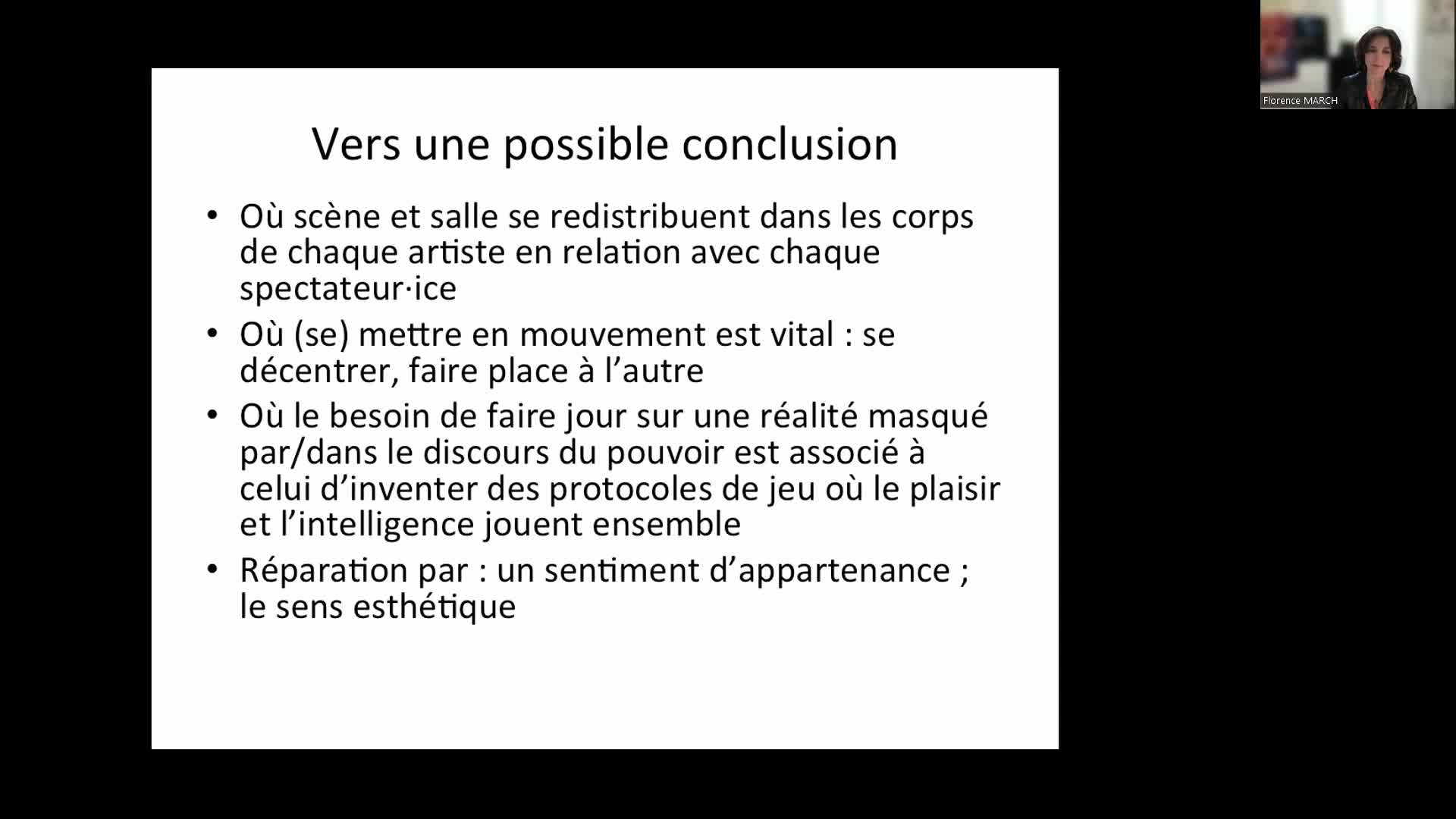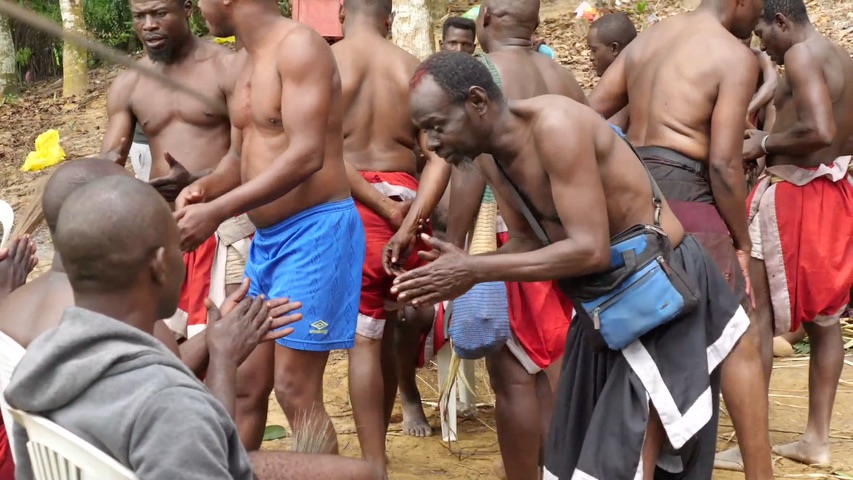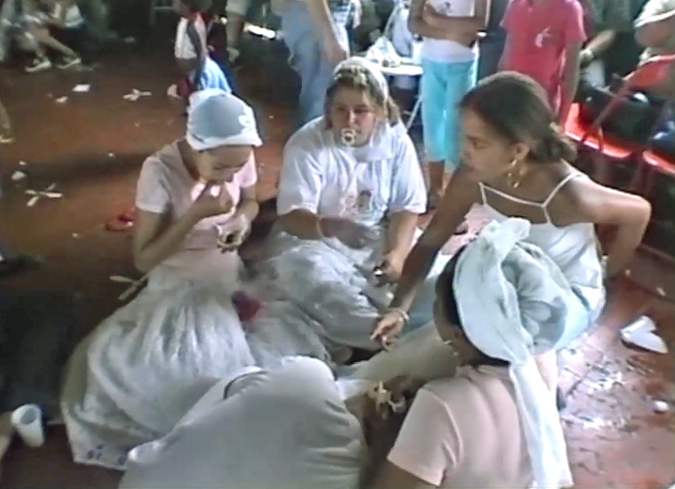Notice
“Beneficial JI” - Short talk 2.3: Rachel-Shlmoit Brezis - Testing the limits – and potential of joint improvisation: Motor skills, social skills and interpersonal synchronization in adults with autism spectrum disorders
- document 1 document 2 document 3
- niveau 1 niveau 2 niveau 3
Descriptif
Research on joint improvisation has shown that expert improvisers, as well as neurotypical individuals, canjointly create novel complex motion, synchronized to less than 180ms (Noy et al., 2011; Hart et al., 2014;Golland et al., 2015; FeiningerSchaalet al., in review). Presumably, this ability relies on these individuals’motor skills and social skills – yet little is known about the preconditions and correlates of successful jointimprovisation. Here, we employ the Mirror Game paradigm (Noy et al., 2011) with a population of adults withAutism Spectrum Disorder (ASD). ASD is defined by a deficit in social and communication skills and atendency for routinized behaviors yet recent research has been pointing to a possibly more primary difficultywith sensorymotorsynchronization in ASD (Gowen & Hamilton, 2013), which may in turn impedeindividuals’ ability to synchronize with others, leading to reduced social and communicative skills (Marsh etal. 2013; de Jaegher, 2013). 40 individuals with autism, and 40 agegenderandIQmatchedTypicallyDeveloping (TD) control participants played the Mirror Game against the same expert improviser. The studyaims to determine: (a) whether individuals with ASD have a reduced capacity for sensorymotorsynchronization compared to TD participants; and (b) whether the ability of both TD and ASD participants tosynchronize their motions with another player is related to basic motor skills (i.e., motor coordination,proprioception and imitation) on the one hand, and participants’ everyday social skills (conversationalrapport, empathy and autism symptom severity) on the other.
Thème
Documentation
Liens
Dans la même collection
-
Joint Improvisation Meetings 2015
We understand joint improvisation as an artistic form involving two or more performers engaging in multiple real-time interactions: with each other, with the audience and with the emerging content.
-
“Quantifying JI” Short talk 1.2: Tommi Himberg - Mirroring improvised hand movements in a dyad
HIRATA Helena Sumiko
We studied coordination and movement kinematics in a mirror game. 32 participants (18 f, 14 m; mean age 25.2 years, range 19–37) performed circledrawing and freely improvised hand movement mirroring
-
“Beneficial JI” - Short talk 2.1: Neta Spiro - Joint improvisation in music therapy: characterising…
SPIRO Neta
Some types of music therapy, such as Nordoff Robbins, involve improvisation by the client and therapist andthe relationship between the participants’ music making is prioritised. Some children with a
-
“Improvising together” Debate
“Improvising together” Debate
-
Joint Improvisation in Music and Dance: Some Preliminary Phenomenological Considerationson Improvis…
MAGRIN-CHAGNOLLEAU Ivan
"I have been a practitioner of soloandjointimprovisationin music and dance for a while. And I have alwayswondered what the main differences were between the two. What I am particularly interested in
-
Carrying the Feeling
MANNING Erin
Carrying the Feeling explores autistic Lucy Blackman’s use of “carrying” as an expressive force in herwriting. Continuing to delve into what I have called autistic perception theforce of perception
-
Improvising Interaction
HEALEY Patrick
Even the most tightly scripted solo performances involve improvisation; the detailed execution of each note or word cannot be completely determined in advance. In joint performances the challenge of
-
Operationalizing Social Neuroscience through HumanHuman and HumanMachine Interactions
DUMAS Guillaume
How are neural, behavioral and social scales coordinated in real time so as to make possible the emergenceof social cognition? Answering this question requires to study the dynamics of coordination in
-
There could be ten seconds where everyone is connected and you feel really joined by the same threa…
CANCE Caroline
Joint actions require an ability to understand and predict the actions of others far enough into the future to have time to plan and execute matching motor programs. Here I will review experiments in
-
“Quantifying JI” Short talk 1.3: Ashley Walton - Musical Improvisation: Spatiotemporal patterns of …
WALTON Ashley
When jazz musicians perform an improvisational piece of music their behaviors are not fully prescribed in advance. Nonetheless their actions become so tightly coordinated and their decisions so
-
“Beneficial JI” - Short talk 2.2: Julien Laroche - Being together when time is improvised: interact…
LARRAíN Pablo
Improvising music toghether involves coping in realtimewith unprecedented patterns of behavior of another. The goal is to achieve and share a meaningful coperformance,and this is done by interacting
-
Going into the unknown in science and art
KEYSERS Christian
Scientists must grope into the undefined place beyond the known. So must improvisation theater actorswalking onto the stage with no idea what will happen next. Improvisation theater developed
Sur le même thème
-
Danse et handicap #1 - Danser et vivre les yeux fermés : aller au bout de ses rêves
HAUSTANT Fabienne
Danse et handicap #1 - Danser et vivre les yeux fermés : aller au bout de ses rêves
-
L'envers du décor: rhéthorique visionnaire et instrumentalisation politique dans l'art dramatique d…
LEFRANçOIS Frédéric
L'envers du décor: rhéthorique visionnaire et instrumentalisation politique dans l'art dramatique de Derek Walcott
-
Faire exister les nouvelles attentions : atelier de Julie Perrin et Pascale Gille
PERRIN Julie
GILLE Pascale
Par un atelier et une discussion, Julie Perrin et Pascale Gille soulignent comment les danseurs et danseuses continuent de faire bouger les lignes du "partage du sensible", en jouant de la frontière
-
Faire corps avec le document : les chorégraphes contemporains face aux crises et aux conflits
Cette communication se centre autour de pièces chorégraphiques qui abordent des situations de crises politiques, économiques, humaines, à travers des matériaux documentaires. Il s’agit de dresser un
-
Les formes de réparation dans les arts de la scène à l’épreuve de la Covid-19 (visio)
RIEDLER Juliette
BURIGHEL Giuseppe
Le webinaire propose un retour sur la journée d’étude et de pratiques artistiques " Les formes de réparation dans les arts de la scène à l’épreuve de la Covid-19 " (qui s’est déroulé le 23 mars 2022 –
-
Après la projection - Discussion autour de « Faraway My Shadow Wandered » de Liao Jiekai et Sudhee …
CHEURFA Célia
JIEKAI Liao
LIAO Sudhee
Discussion avec les réalisateurs Liao Jiekai et Sudhee Liao, en dialogue avec Jean-Michel Butel, ethnologue, maître de conférences à l'Inalco, spécialiste des évolutions sociales et des structures
-
-
Cérémonies et rituels de l’umbanda : la fête des enfants Marília, État de São Paulo Brésil, les 13 …
JACQUEMOT Armelle
Terreiro du Vieux-noir Pai Fabiano, Marília, État de São Paulo (Brésil), les 13 et 14 octobre 2001
-
Corps dansant et corps bourgeois : la fabrique des normes au XIXe siècle
MARQUER Bertrand
JARRASSE Bénédicte
Conférences | Vendredi 15 novembre Bertrand Marquer | La norme et l’écart : imaginaire et savoirs du corps au XIXe siècle Bénédicte Jarrasse | Corps-machines : la danse et l
-
-
-

























